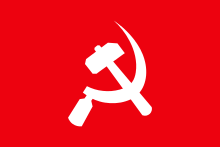Ajoy Ghosh
Ajoy Kumar Ghosh (Bengali: অজয়কুমার ঘোষ) (20 February 1909–13 January 1962[1]) was an Indian freedom fighter and prominent leader of the Communist Party of India.[2]
Ajoy Ghosh | |
|---|---|
| General Secretary of Communist Party of India | |
| In office 1954–1962 | |
| Preceded by | Chandra Rajeswara Rao |
| Succeeded by | Chandra Rajeswara Rao |
| Personal details | |
| Born | February 20, 1909 Bardhaman district, West Bengal, India |
| Died | January 13, 1962 (aged 52) |
| Nationality | Indian |
| Political party | Communist Party of India |
| Occupation | Politician
Indian freedom fighter |
| Part of a series on |
| Communism in India |
|---|
 |
|
Personalities
|
|
Cold War years
|
|
Other articles |
|
|
Early life
Ghosh was born in Mihijam village of Bardhaman district in the state of West Bengal, India. He went with his father Doctor Shachindranath Ghosh to Kanpur.[3]
Political life
In 1926 before entering in Allahabad University Ghosh met with Bhagat Singh and Batukeshwar Dutt. He was a member of Hindustan Socialist Republican Association. He was arrested and latter imprisoned after Lahore Conspiracy Case trial in 1929 but released due to lack of evidence. He was again arrested in 1931 and came into contact with Srinivas Sardeshai in jail. After release he joined in the Communist Party of India.[3] In 1934, he was elected to the Central Committee of the CPI and in 1936 he was elected to its Polit Bureau. In 1938, Ghosh became the member of the editorial board of the Party's mouthpiece, the National Front. He was the General Secretary of the Communist Party of India from 1951 till his death in 1962. He was leading the Communist Party of India during the China-India war in 1962 and supported India's position instead of that of the People's Republic of China.[4][5] He was the prominent person in the centrist faction before the split of the Communist Party of India (Marxist) from the Communist Party of India.
Works
References
- Anil Rajimwale (26 December 2009). "Ajoy Ghosh: The Creative Marxist". Mainstream Weekly.
- Pyotr Kutsobin (1987). Ajoy Kumar Ghosh and Communist movement in India. Sterling Publishers, New Delhi. OL 2508703M.
- Vol - I, Subodh C. Sengupta & Anjali Basu (2002). Sansad Bangali Charitavidhan (Bengali). Kolkata: Sahitya Sansad. p. 5. ISBN 81-85626-65-0.
- The India-China Border Dispute and the Communist Party of India: Resolutions, Statements and Speeches, 1959-1963 (Communist Party of India, 1963), 61-96
- “The Sino-Indian Border Dispute,” B. 644 (R) November, 1962, 4, India, CPR 12-61-12-62 folder 3 of 4, Papers of President Kennedy, National Security File, Robert Komer, Box 420, John F. Kennedy Library.